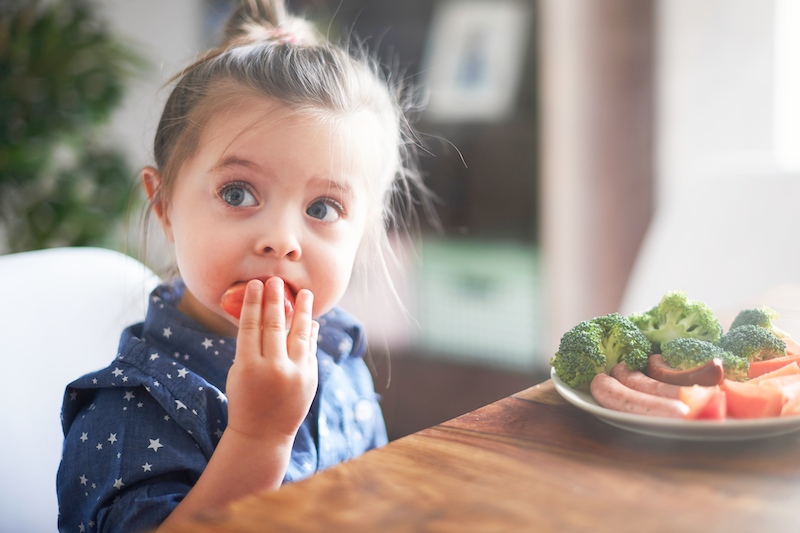The trend towards a plant-based diet is gaining more and more followers and numerous people are opting for a meat-free diet. But is a vegetarian or vegan diet a healthy nutritional approach for children? This article answers this question and takes a closer look at plant-based nutrition for children.
Vegetarian and vegan nutrition in Switzerland
Do vegetarians and vegans live healthier lives? This is a question that opens up numerous discussions and is considered a hotly debated topic. Ever more people are opting for a vegan or vegetarian diet. In Europe, it is estimated that around 2-5 % of adults eat a vegetarian diet. According to Swissveg, around 11 % of adults in Switzerland follow a plant-based diet, of which around 3 % are vegan.
In addition, more women and girls are vegetarians than men. The younger generation is also increasingly opting for a meat-free diet, so that the number of vegetarians is also steadily increasing in this age group.
Due to this change, more and more grocery stores, online retailers such as Farmy, restaurants and fast food chains are reacting and adapting their offerings accordingly. The variety of vegan and vegetarian products has increased noticeably and there is now an extensive and varied range.
Definition of vegetarian and vegan diet
Basically, the vegetarian diet defines that vegetarians do not eat animal meat products. Consequently, meat and fish are not part of the diet.
In the vegan diet, animal foods are completely avoided, including honey and dairy products. There are many different forms of this diet, with ethical and religious reasons also influencing the diet in a more differentiated way.
Is a vegetarian or vegan diet healthy?
“You lack certain nutrients if you don’t eat meat!” This statement is a widespread misconception that has nevertheless stubbornly taken hold in many people’s minds. According to the Swiss Society for Nutrition (SGE), a vegetarian diet is considered to meet nutritional needs even in the long term.
As with meat and fish diets, vegetarians must take certain points into account to ensure a balanced diet without deficiency symptoms. In addition to physical activity, these include, for example, abstaining from tobacco and moderate alcohol consumption.
Important nutrients such as protein, vitamin B, iron, calcium or omega-3 are consumed by vegetarians through vegetarian foods such as milk, eggs or oils, which means that these nutrients can also be ingested. Fundamentally, it has been found that people who follow a plant-based diet generally live more consciously, pay attention to their health and follow a corresponding lifestyle.
With a vegan diet, on the other hand, the absence of animal products further restricts the diet. As a result, a more targeted and conscious diet is recommended here so that the nutrient content can be met. Thus, the SGE also classifies the vegan diet as suitable.
Vegetarian and vegan diets in children: Is it healthy?
“You can’t do that!” This and other phrases are often heard among parents when discussing children’s nutrition. Parents do not want to negatively influence the health of their own children, but rather to promote their health in the long term. But does a vegetarian diet harm children and adolescents?
Based on this topic, the paediatricians Henrik Köhler and Andreas Bieri of the Cantonal Hospital Aarau have summarised various studies on the topic of “vegetarian/vegan nutrition” in an interesting article. This article explains that a vegetarian diet has health benefits. For example, adults often have a lower body mass index (BMI) and risk factors such as smoking, alcohol consumption or little physical activity are also observed less frequently in vegetarians.
Vegetarian diet in children and adolescents
With regard to children and adolescents, less data is available so far. Nevertheless, meaningful trends are emerging. Andreas Bieri, for example, is convinced that a vegetarian diet – with a high awareness of critical nutrients – is generally a healthy form of nutrition at any age. Consequently, the vegetarian diet can be classified as harmless in infancy as well as in childhood up to adulthood.
Vegan diet in children and adolescents
It is different with the vegan diet: it is not recommended for infants and children. A vegan diet without deficiency symptoms is only possible in young children if the parents have sufficient knowledge, the food intake is carefully planned and regular clinical checks are carried out. This includes, among other things, a defined vitamin and nutrient intake, sufficient calories and possible addition of nutrient supplements.
Particularly during the growth phase, young children have an increased need for nutrients such as protein. Although a vegan diet does not exclude this, more conscious attention must be paid to the menu. Since this is considered cumbersome and almost impossible to implement in everyday life, experts advise against a vegan diet for infants and children.
Conclusion
In summary, a vegetarian diet for children is definitely beneficial to health. A vegan diet without background knowledge and important precautions, on the other hand, is clearly discouraged.
Source: Vegetarische und vegane Ernährung von Kindern und Jugendlichen











What do you think?